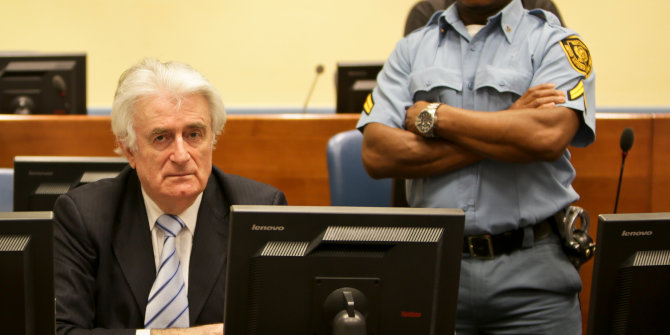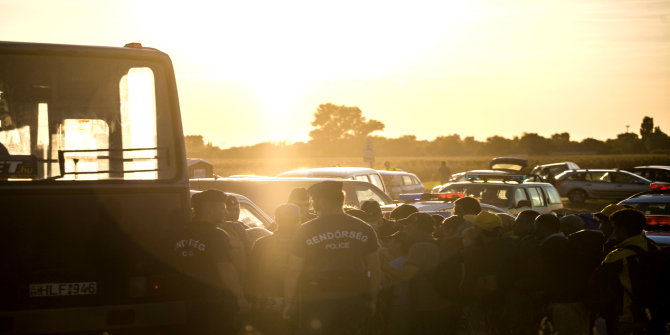 Radovan Karadžić was sentenced to life in prison on 20 March at the International Criminal Tribunal for the Former Yugoslavia, following a lengthy legal process. Marika Djolai writes that the verdict might potentially signal closure for Bosnia and Herzegovina, but could also lead to further divisions within society.
Radovan Karadžić was sentenced to life in prison on 20 March at the International Criminal Tribunal for the Former Yugoslavia, following a lengthy legal process. Marika Djolai writes that the verdict might potentially signal closure for Bosnia and Herzegovina, but could also lead to further divisions within society.
On 20 March, Radovan Karadžić sat in the courtroom of the International Criminal Tribunal for the Former Yugoslavia (ICTY) with a blank expression and quiet demeanour, listening to his final verdict being read out. The Appeals Chamber not only upheld previous convictions of genocide, crimes against humanity and war crimes committed by Serb forces under Karadžić’s leadership during the Bosnian war (1992-1995), but sentenced him to life in prison, overturning the previous verdict of 40 years imprisonment. Karadžić was first convicted almost exactly three years ago on 24 March 2016, following a six-year trial. Both prosecution and defence appealed against the 2016 verdict.
The final verdict still failed to confirm Karadžić’s individual criminal responsibility for genocide in Prijedor, Sanski Most and Ključ in North-West Bosnia and Vlasenica, Zvornik, Bratunac and Foča located to the east, on the border with the Republic of Serbia. Many victims have found this part of the verdict flawed and unjust, and have not held back from voicing their personal disappointment widely on social and conventional media since the verdict was made public. All the other grounds of the prosecution appeal were upheld. Even though there is no further right to appeal, Karadžić’s lawyer, Peter Robinson, said his client remained determined to clear his name. The defence maintained that Karadžić didn’t hold criminal responsibility for the crimes he was convicted of, although he accepted “moral responsibility” for them.
This, of course, is highly problematic given that the war in Bosnia and Herzegovina was the deadliest violent conflict in Europe since World War II. Many of the 100,000 dead victims’ families found Karadžić’s defence ludicrous, not to mention his claim that the testimonies of the survivors concerning the numerous crimes documented as part of the trial were just rumours and myths. Some of the crimes include massive displacement that pushed around 2.2 million citizens out of their place of living; the total destruction of around 420,000 homes and other assets; and severe damage to public infrastructure and much of the country’s historical and religious sites, particularly of Islamic religious origin. Anyone who lived in Bosnia and Herzegovina during the conflict or who has since visited or resided in the country will have witnessed at least some trace of the vast devastation inflicted.
Nevertheless, there was a notable satisfaction with the outcome of the trial and Karadžić’s life sentence. The victims of violence who were present in the ICTY courtroom cheered and clapped. Statements of relief and a sense of closure poured out from Bosnia and Herzegovina and from the victims who ended up permanently living abroad as a direct consequence of the war. However, the length of the proceedings, following the eleven years that Karadžić spent in hiding before being arrested in Serbia in 2008 and extradited to the ICTY, means that many of the victims didn’t live to witness his verdict.

Radovan Karadžić, Credit: UN International Criminal Tribunal for the former Yugoslavia (CC BY 2.0)
The most serious crime Karadžić and his accomplices were accused of, the genocide in Srebrenica, is still disputed by Milorad Dodik, the long-term President and Prime Minister of Republika Srpska, who is currently one of the three members of the Bosnia and Herzegovina Presidency. Alongside Dodik and his party’s claims about the politicisation of the proceedings, some more reasonable political voices from Republika Srpska were heard as well following the verdict. They suggested that the future of Bosnia and Herzegovina lies in reconciliation. The conclusion of the trial was the first stepping-stone for this, although coming to terms with Karadžić’s verdict will represent a great challenge for Bosnian Serbs. Even if tiny, this shift in public perceptions and political discourse in Republika Srpska is a very good sign for everyone.
Belgrade did not immediately react to the verdict. President Vučić finally addressed the verdict three days later, pointedly framing his statement on the importance of building a stronger and more stable Serbia. He also stated that Republika Srpska will continue to exist. This was in stark contrast with a statement last year by Serbian Prime Minister Ana Brnabic, who stated that in “her opinion” Srebrenica is a terrible crime but not genocide.
There are several ramifications of the verdict for the future, but the question remains as to whether they will bring something positive to Bosnia and Herzegovina. First, convicting Karadžić for specific crimes takes away, at least partially, the idea and a prevalent narrative that Serbs are a “genocidal nation (narod)” and that there is a collective responsibility carried by the entire nation. This opens the possibility for creating balance between the three national groups in Bosnia and Herzegovina and building bridges. But this will only happen if the verdict creates a space for an open and constructive dialogue that will allow Serbs in the country and perhaps in Serbia to talk amongst themselves and come to a consensus about what has been done in the name of the nation.
Second, the verdict and the process that led to it helped establish facts about the war crimes, lines of responsibility, including Karadžić’s, and the application of punitive measures for such crimes. Despite criticism, the ICTY demonstrated that international prosecution has an important role in ending impunity. These are necessary steps for removing grounds for collective blame by other ethnic communities in Bosnia and Herzegovina.
Third, many members of the political elites built their position and power on the legacy of the war, or by portraying themselves as war heroes and important factors in the creation of Republika Srpska. This helps them hold onto their power, even if they lack genuine care for citizens, the entity and the country as a whole. This verdict may motivate citizens to question their legacy and intentions and see the alleged heroic acts for what they are – means to clinging onto power.
The length of the trial also provided an advantage as it allowed enough time for the social processes of everyday life in many local communities to create favourable conditions for reconciliation and for repairing the societal fabric on a small scale through interactions and cooperation. This has led to the emergence of organic solidarity in local communities that, in the absence of localised transitional justice mechanisms, has helped to slowly overcome the consequences of the crimes. Conditions were not so favourable ten years ago when Karadžić was sent to the ICTY.
The closure of the Karadžić case may open a new space for these initiatives to become more prominent, which in turn may lead to stronger challenges to ethnic power-sharing and the dominance of nationalistic elites. Globally, the relevance of the Karadžić verdict illustrates that genocide and crimes against humanity are punishable, which should send a strong message and set the grounds for other similar cases, but also hopefully prevent other similar crimes from occurring in the first place.
Please read our comments policy before commenting.
Note: This article gives the views of the author, not the position of EUROPP – European Politics and Policy or the London School of Economics.
_________________________________
 Marika Djolai
Marika Djolai
Marika Djolai is an independent scholar and policy analyst affiliated with the Balkans in Europe Policy Advisory Group (BiEPAG). She holds Master’s degrees from the University of Novi Sad and University College London, and received her Doctorate in Development Studies (Conflict and Violence) in 2016 from the Institute of Development Studies at the University of Sussex.



